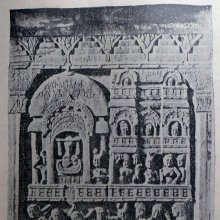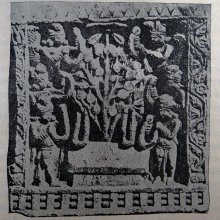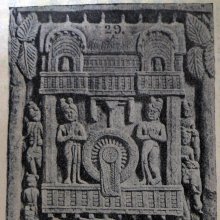Lokuttara, Lokottara, Loka-uttara, Lokottarā: 24 definitions
Introduction:
Lokuttara means something in Buddhism, Pali, Hinduism, Sanskrit, Marathi, Hindi. If you want to know the exact meaning, history, etymology or English translation of this term then check out the descriptions on this page. Add your comment or reference to a book if you want to contribute to this summary article.
Alternative spellings of this word include Lokottar.
Images (photo gallery)
In Hinduism
Shaivism (Shaiva philosophy)
Source: Brill: Śaivism and the Tantric TraditionsLokottara (लोकोत्तर) or the Lokottaramārga refers to the “transcendental path”, according to the Vārāṇasīmāhātmya verse 1.116-125.—Accordingly, “[...] The gods, beginning with Brahmā, also proceed along the Laukikamārga. The God of gods, Virūpākṣa, who is established in the Lokottara-mārga [i.e., mārge lokottare sthitaḥ], proceeds beyond [the institutes of] sacrifice, giving and asceticism. But those sages who are on that path, delighting in the knowledge of the self, also proceed along the Lokottaramārga, abandoning their bodies. [...]”.

Shaiva (शैव, śaiva) or Shaivism (śaivism) represents a tradition of Hinduism worshiping Shiva as the supreme being. Closely related to Shaktism, Shaiva literature includes a range of scriptures, including Tantras, while the root of this tradition may be traced back to the ancient Vedas.
In Buddhism
Theravada (major branch of Buddhism)
Source: Access to Insight: A Glossary of Pali and Buddhist TermsTranscendent; supramundane (see magga, phala, and nibbana).Source: Journey to Nibbana: Patthana DhamaLokuttara means greater than worldly things, higher than worldly thing, beyond worldly thing, or supramundane.
Source: Buddhist Information: A Survey of Paramattha DhammasLokuttara is beyond the world.
Source: Pali Kanon: Manual of Buddhist Terms and Doctrines'supermundane',
is a term for the 4 paths and 4 fruitions of sotāpatti, etc. (s. ariya-puggala), with Nibbāna as ninth.
Hence one speaks of '9 supermundane things' (nava-lokuttara-dhamma). Cf. prec.
Source: Dhamma Study: CetasikasCittas which experience;
Source: Pali Kanon: A manual of AbhidhammaLoka + Uttara = Lokuttara. Here Loka, means the five aggregates. Uttara means above, beyond or that which transcends. It is the supra mundane consciousness that enables one to transcend this world of mind body
Theravāda is a major branch of Buddhism having the the Pali canon (tipitaka) as their canonical literature, which includes the vinaya-pitaka (monastic rules), the sutta-pitaka (Buddhist sermons) and the abhidhamma-pitaka (philosophy and psychology).
Tibetan Buddhism (Vajrayana or tantric Buddhism)
Source: Wisdom Library: Tibetan Buddhism1) Lokottara (लोकोत्तर) is the name of an Uṣṇīṣa king [i.e., Uṣṇīṣarāja] mentioned as attending the teachings in the 6th century Mañjuśrīmūlakalpa: one of the largest Kriyā Tantras devoted to Mañjuśrī (the Bodhisattva of wisdom) representing an encyclopedia of knowledge primarily concerned with ritualistic elements in Buddhism. The teachings in this text originate from Mañjuśrī and were taught to and by Buddha Śākyamuni in the presence of a large audience (including Lokottara).
2) Lokottarā (लोकोत्तरा) is also the name of a Yakṣiṇī mentioned as attending the teachings in the 6th century Mañjuśrīmūlakalpa.

Tibetan Buddhism includes schools such as Nyingma, Kadampa, Kagyu and Gelug. Their primary canon of literature is divided in two broad categories: The Kangyur, which consists of Buddha’s words, and the Tengyur, which includes commentaries from various sources. Esotericism and tantra techniques (vajrayāna) are collected indepently.
Mahayana (major branch of Buddhism)
Source: academia.edu: A Study and Translation of the GaganagañjaparipṛcchāLokottara (लोकोत्तर) refers to “transcendental (dharma)”, according to the Gaganagañjaparipṛcchā: the eighth chapter of the Mahāsaṃnipāta (a collection of Mahāyāna Buddhist Sūtras).—Accordingly, “How then, son of good family, is the Bodhisattva supported by the presence of the Buddha as unhindered and uninterrupted eloquence (pratibhāna)? Son of good family, there are the Bodhisattvas’ twenty-four sorts of eloquence. What are those twenty-four? [...] 18) eloquence adorned with the congregations of gods; 19) eloquence of cutting off all doubts; 20) eloquence of the mundane (laukika) and transcendental (lokottara) dharma; [...]”.

Mahayana (महायान, mahāyāna) is a major branch of Buddhism focusing on the path of a Bodhisattva (spiritual aspirants/ enlightened beings). Extant literature is vast and primarely composed in the Sanskrit language. There are many sūtras of which some of the earliest are the various Prajñāpāramitā sūtras.
Languages of India and abroad
Pali-English dictionary
Source: BuddhaSasana: Concise Pali-English Dictionarylokuttara : (adj.) super-mundane; transcendental.
Source: Sutta: The Pali Text Society's Pali-English DictionaryLokuttara refers to: see under lokiya.
Note: lokuttara is a Pali compound consisting of the words loka and uttara.

Pali is the language of the Tipiṭaka, which is the sacred canon of Theravāda Buddhism and contains much of the Buddha’s speech. Closeley related to Sanskrit, both languages are used interchangeably between religions.
Marathi-English dictionary
Source: DDSA: The Molesworth Marathi and English Dictionarylōkōttara (लोकोत्तर).—a (S) Beyond what is common; excelling, surpassing, extraordinary, transcendent.
Source: DDSA: The Aryabhusan school dictionary, Marathi-Englishlōkōttara (लोकोत्तर).—a Beyond what is common; excelling.
Marathi is an Indo-European language having over 70 million native speakers people in (predominantly) Maharashtra India. Marathi, like many other Indo-Aryan languages, evolved from early forms of Prakrit, which itself is a subset of Sanskrit, one of the most ancient languages of the world.
Sanskrit dictionary
Source: DDSA: The practical Sanskrit-English dictionaryLokottara (लोकोत्तर).—a. extraordinary, uncommon, unusual; लोकोत्तरा च कृतिः (lokottarā ca kṛtiḥ) Bv.1.69.7; Uttararāmacarita 2.7.
-raḥ a king. °वादिन् (vādin) m. pl. Name of a Buddhist school.
Lokottara is a Sanskrit compound consisting of the terms loka and uttara (उत्तर).
Source: Cologne Digital Sanskrit Dictionaries: Edgerton Buddhist Hybrid Sanskrit DictionaryLokottara (लोकोत्तर).—adj. (compare Sanskrit id., Pali lokuttara; compare lokika, laukika), super-worldly, especially (but not invariably) said of a Buddha and all his aspects and activities, according to the Lokottaravādin school: °rasya Buddhasya Śākyamunino Mahāvastu i.48.15; °rā(ḥ), said of Buddhas, i.96.12; (na hi kiṃcit samyaksaṃbuddhānāṃ lokena samaṃ,) atha khalu sarvam eva maharṣiṇāṃ lokottaraṃ i.159.3 (a summary statement of the doctrine of the L. school); various functions of the Buddha specifically called lok° Mahāvastu i.167.17, 18 (see s.v. niṣaṇṇa); 168.1, 2, 3, 4, 9; in Divyāvadāna 161.25 no creature can comprehend a Buddha's lokottara-cittaṃ, but any creature can understand his laukikaṃ (q.v.) cittaṃ (line 23); (Bodhisattvas) budhyanty āśayasaṃyuktā loke lokot- tare tathā Mahāvastu i.86.4, are enlightened in regard to the world and the supramundane, which I think may mean (in the dogmatic sense) what pertains to the Buddha, tho Senart thinks differently; °raṃ arthaṃ (supramundane goal) prārthayamāno Bodhisattvo Mahāvastu ii.279.8; °rābhiḥ kathā- bhiḥ Sukhāvatīvyūha 59.10, see s.v. lokika; in Laṅkāvatāra-sūtra 156.15 (compare 157.9, 11) jñāna, and in 237.2—3 ff. pāramitā, are of three kinds, laukika (of worldly persons and heretics), lokottara (of śrāvakas and pratyekabuddhas), and lokottaratama (of Bodhisattvas); here the word can hardly have its technical dogmatic meaning.
Source: Cologne Digital Sanskrit Dictionaries: Cappeller Sanskrit-English DictionaryLokottara (लोकोत्तर).—[adjective] surpassing the world or what is common; unusual, extraordinary.
Source: Cologne Digital Sanskrit Dictionaries: Aufrecht Catalogus CatalogorumLokottara (लोकोत्तर) as mentioned in Aufrecht’s Catalogus Catalogorum:—a work, quoted by Hemādri in Dānakhaṇḍa p. 462.
Source: Cologne Digital Sanskrit Dictionaries: Monier-Williams Sanskrit-English Dictionary1) Lokottara (लोकोत्तर):—[from loka > lok] mf(ā)n. excelling or surpassing the w°, beyond what is common or general, unusual, extraordinary, [Kathāsaritsāgara; Rājataraṅgiṇī] etc.
2) [v.s. ...] ([in the beginning of a compound]) ind., [Hemacandra’s Pariśiṣṭaparvan]
3) [v.s. ...] m. an uncommon person, [Uttararāma-carita]
4) [v.s. ...] or n. (?) Name of [work]
Source: DDSA: Paia-sadda-mahannavo; a comprehensive Prakrit Hindi dictionary (S)Lokottara (लोकोत्तर) in the Sanskrit language is related to the Prakrit words: Louttara, Loguttara.
[Sanskrit to German]
Sanskrit, also spelled संस्कृतम् (saṃskṛtam), is an ancient language of India commonly seen as the grandmother of the Indo-European language family (even English!). Closely allied with Prakrit and Pali, Sanskrit is more exhaustive in both grammar and terms and has the most extensive collection of literature in the world, greatly surpassing its sister-languages Greek and Latin.
Hindi dictionary
Source: DDSA: A practical Hindi-English dictionaryLokottara (लोकोत्तर) [Also spelled lokottar]:—(a) supernatural, transcendental; extra-worldly; extraordinary; hence ~[tā] (nf).
...
Kannada-English dictionary
Source: Alar: Kannada-English corpusLōkōttara (ಲೋಕೋತ್ತರ):—[adjective] excelling or surpassing the world; beyond what is common or general; unusual; extraordinary.
--- OR ---
Lōkōttara (ಲೋಕೋತ್ತರ):—
1) [noun] that which is extraordinary or uncommon.
2) [noun] a man who excels or surpasses all others of his class in the world; a man of extraordinary merit.
Kannada is a Dravidian language (as opposed to the Indo-European language family) mainly spoken in the southwestern region of India.
Nepali dictionary
Source: unoes: Nepali-English DictionaryLokottara (लोकोत्तर):—n. supernatural; extraordinary; difficult to obtain from worldly matters;
Nepali is the primary language of the Nepalese people counting almost 20 million native speakers. The country of Nepal is situated in the Himalaya mountain range to the north of India.
See also (Relevant definitions)
Partial matches: Loka, Uttara.
Starts with: Lokuttara Citta, Lokuttarakatha.
Full-text (+43): Lokuttara Citta, Magga Citta, Lokottar, Lokiya, Lokottaraparivarta, Lokottaram, Phala Citta, Supermundane, Lokottaravadin, Loguttara, Louttara, Tilokanagara, Nirvana, Five Super-Mundane Components, Laukika, Lokika, Kama Kusala, Citta, Nishanna, Raji.
Relevant text
Search found 55 books and stories containing Lokuttara, Loka-uttara, Lokottara, Lōkōttara, Lokottarā; (plurals include: Lokuttaras, uttaras, Lokottaras, Lōkōttaras, Lokottarās). You can also click to the full overview containing English textual excerpts. Below are direct links for the most relevant articles:
Maha Prajnaparamita Sastra (by Gelongma Karma Migme Chödrön)
Part 11 - Non-existence of the thing given < [Chapter XX - The Virtue of Generosity and Generosity of the Dharma]
I. The essence of the perfections resides in the mind < [Part 1 - Obtaining easily an immense qualification]
II. Knowledge of the aspect of the paths < [VI. Acquiring the knowledges of the paths and the aspects of the paths]
A Manual of Abhidhamma (by Nārada Thera)
The Four Classes Of Consciousness < [Chapter I - Different Types of Consciousness]
Section on Planes < [Chapter IV - Analysis of Thought-Processes]
Supra Mundane Consciousness < [Chapter I - Different Types of Consciousness]
Aesthetic Experience < [January – March, 1978]
Patthana Dhamma (by Htoo Naing)
Chapter 5 - Hetu paccayo (or root condition)
Chapter 1 - Citta (or consciousness)
Sahitya-kaumudi by Baladeva Vidyabhushana (by Gaurapada Dāsa)
Text 4.36 < [Chapter 4 - First-rate Poetry]
Text 10.85 < [Chapter 10 - Ornaments of Meaning]
Text 4.10 < [Chapter 4 - First-rate Poetry]
Cetasikas (by Nina van Gorkom)
Appendix 5 - Appendix To Chapter 11 < [Appendix And Glossary]
Appendix 3 - Appendix To Chapter 8 < [Appendix And Glossary]
Appendix 8 - Appendix To Chapter 31 < [Appendix And Glossary]
.jpg)
.jpg)


